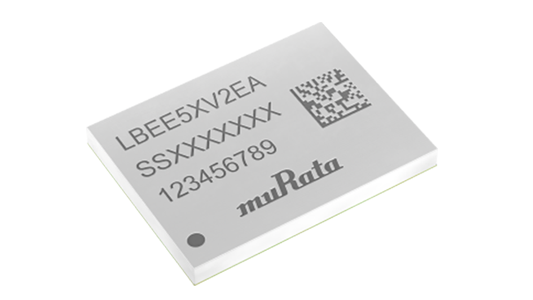Murata has further expanded its range of state-of-the-art wireless communication modules. The new LBEE5XV2EA (Type 2EA) module utilises Infineon’s CYW55573 system-on-chip (SoC), providing Bluetooth® 5.3 and triband Wi-FiTM operation – which includes both 2.4GHz and 5GHz bands as well as 6GHz band, Wi-Fi 6E, support.
With many areas of the RF spectrum becoming increasingly overcrowded, Wi-Fi communication speeds can often suffer. The latest Wi-Fi 6E standard allows the same 9.6Gbps data rate as 5GHz Wi-Fi 6, but overall performance is more consistent thanks to less congestion and interference at 6GHz frequencies. Furthermore, Wi-Fi 6E provides additional (and wider) broadcast radio channels, which helps to increase data throughput in high-traffic areas.
The module supports Wi-Fi 6’s target wake time (TWT) feature. This ensures that the device spends more time in standby mode, only communicating when necessary to reduce overall energy consumption and optimise network efficiency.
The Type 2EA is equipped with on-board Bluetooth 5.3 functionality, including Bluetooth LE (low energy) Audio. This standard employs a new audio codec known as low complexity communications codec (LC3), which provides enhanced high-quality audio at a lower power requirement than Bluetooth Classic.
20/40/80MHz channels are all incorporated into the module, with 1024-QAM modulation and a 2×2 MIMO antenna arrangement, helping to achieve heightened levels of data throughput. The Type 2EA’s wireless specification meets the latest IoT demands, making it ideal for low-latency communication applications such as video streaming, conference systems, virtual reality (VR) and augmented reality (AR) equipment, surveillance camaras, high resolution digital still camara, and alarm systems.
Compared to other Wi-Fi 6E solutions available on the market, the Type 2EA has a better optimised design, thanks to utilising Murata’s high-performance components and miniaturisation expertise. With its surface mount device (SMD) design and compact size of just 12.5mm x 9.4mm x 1.2mm, the wireless module allows for easy system integration.
While FCC certification is in preparation, the availability of ISED and MIC certification, along with conductive tests for CE, also helps to simplify any compliance process. This means that fewer engineering resources need to be committed, delivering both time and cost savings.












